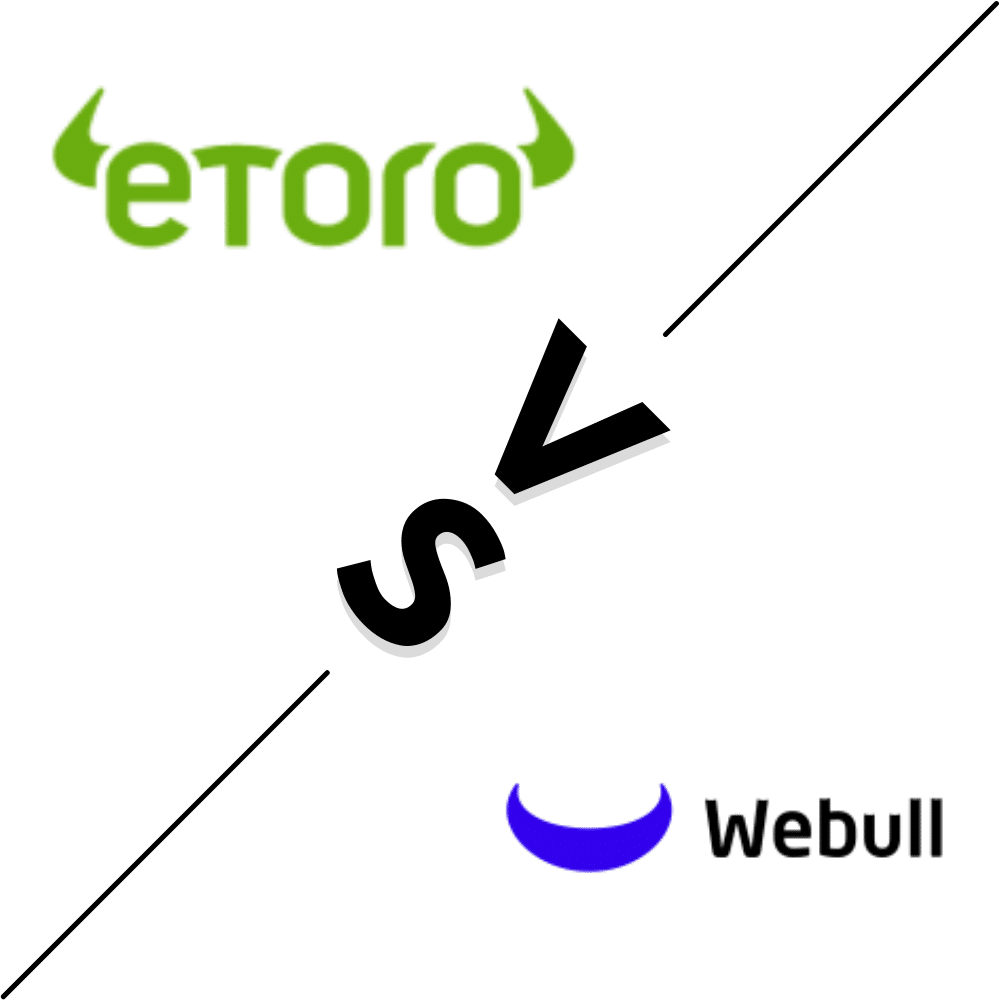I've compared eToro USA LLC with quite a handful of competitors, and in most cases, the platform was more advantageous than its counterparts.
If you are wondering if Webull is better than eToro, the answer is not always straightforward. Below we compare Webull vs eToro, based on a variety of factors.
Overview of the Trading Platforms: Webull & eToro
Cryptocurrency trading can be risky if you don't know which trading platform is reliable. Fortunately, I took it upon myself to help you find the best broker. After spending hours evaluating the platforms, I've compiled a detailed table with the most important information.
Before going into detail, assess the table that gives the first important insight into Webull and eToro.
| eToro | Webull | |
|---|---|---|
| Information |  eToro is a trading platform trusted by millions of traders for investing in stocks and cryptocurrencies, both through ownership and CFDs. eToro is a trading platform trusted by millions of traders for investing in stocks and cryptocurrencies, both through ownership and CFDs. |  Webull Financial LLC is an online trading platform, offering its clients trading in stocks, options, margins, cryptocurrencies, and ETFs. Retail clients have access to US, Hong Kong, and global markets. Webull Financial LLC is an online trading platform, offering its clients trading in stocks, options, margins, cryptocurrencies, and ETFs. Retail clients have access to US, Hong Kong, and global markets. |
| Good For: | Copy Trading | Active Traders, Commission-Free Stocks, Market Data |
| Founded: | 2007 | May 24, 2017 |
| Headquarter: | Tel Aviv-Yafo, Israel | New York, United States |
| Broker Type: | Market Maker, Agency Broker | N/A |
| U.S. Clients Allowed: | Yes (certain states) | Yes |
| Available Outside U.S. | Yes | Yes (Malaysia, Japan, India, China) |
| Demo Account: | Yes | Yes |
| Minimum Deposit: | $50 - $100 | $0 - $2000 (Margin account) |
| Deposit Methods: | Skrill, Neteller, Debit Card, Rapid Transfer,iDEAL, Klarna / Sofort Banking, Bank Transfer, Online Banking - Trustly | Bank Transfer |
| Regulation: | FCA, CySEC, ASIC, FSAS | SEC, FINRA |
| Stocks: | Yes | Yes (NYSE, NASDAQ, AMEX) |
| Forex: | Yes | No |
| Commodities: | Yes (31) | No |
| Cryptocurrencies: | Yes (30) | No |
| ADR: | No | No |
| Options: | No | Yes |
| Mutual Funds: | No | No |
| ETFs: | Yes | Yes |
| Binary Options: | No | No |
| Mobile Trading: | Yes (iOS,Android) | Yes (iOS,Android) |
| Proprietary Platform: | Yes | Yes |
| Desktop Platform: | No | Yes |
| cTrader: | No | No |
| DupliTrade: | No | No |
| MetaTrader 4: | No | No |
| MetaTrader 5: | No | No |
| Copy Trading: | Yes | No |
| Trading Signals: | Yes, through copy trading | No |
| Maximum Leverage: | 1:30 | Margin Trading |
| Islamic Account: | Yes | No |
| Support Hours: | 24/5 | 24/7 |
| Phone Support: | No | No |
| Live Chat: | No | No |
| Email Support: | Yes | Yes |
eToro is a multi-asset investment platform. The value of your investments may go up or down. Your capital is at risk.
Types of Products and Markets Available
To get to the bottom of which trading platform is actually better, you need to see what products and markets they offer. Experienced investors wouldn't want to miss out on any profitable offering.
Both Webull and eToro have a common range of products:
- Stocks
- ETF trading features
- Options trading
- Cryptocurrency trading
eToro has the upper hand as the trading platform offers crypto wallets, while Webull is still in the beta testing stage. eToro users will have an abundant selection of trading with:
- Indices
- Futures
- Commodities
- Currencies
- Forex trading
Webull is not far behind, as the platform also features interesting offerings, such as:
- Cash management
- OTC
- Fractional shares
- Paper Trading
- Recurring investment
eToro offers essential assets with an intuitive mobile app. Beginner investors won't waste their time getting a hold of everything.
In comparison, advanced investors will find Webull more sophisticated with all the trading apps the company offers.
Neither platform features mutual funds, bonds, or other assets.
Order Types
The investing habits of experienced traders vary. Some prefer to utilize sophisticated order types, while other traders keep it simple.
Having an eToro account, you have access to basic order types like:
- Market order
- Limit orders
- Time-in-force (TIF)
- Fill-or-Kill (FOK)
- Immediate-or-cancel (IOC)
- Good-til-date (GTD)
- One-triggers-the-other (OTO)
- One-cancels-the-other (OCO)
- Order-triggers-the-other (OTO)
Webull, on the other hand, offers more complex orders that include:
- One-cancels-the-other (OCO)
- One-triggers-the-other (OTO)
- One-triggers-an-OCO (OTOCO)
- Limit order
- Market order
- Stop order
- Stop limit order
- Trailing stop
- Take profit/Stop loss order
Accessibility
You can start trading with both eToro and Webull on PC and mobile apps (iOS and Android). I find both platforms intuitive, providing in-depth insights into investments. Here is a detailed look into each platform:
Trading Experience with eToro
Using the eToro platform on a PC is effortless; there is also a platform available for download. The same applies to mobile users who prefer to monitor investments on the go. As expected, the actions you take on a desktop platform are synced with your eToro mobile app.
The benefits of the eToro web platform and mobile app are that they offer a variety of features that are clear and transparent for novices and more experienced investors. One of the particularly useful features is the customization of smart portfolios, letting you focus on what's important.
Trading Experience with Webull
The same can be said about Webull; the platform, too, offers comprehensive tools and lets you customize them however you see fit. I would say that Webull is more suitable for intermediate traders who have already gained expertise in the field, while eToro can be a good place to start and develop.
Fees
Choosing between Webull and eToro may be a difficult decision to make as the two platforms are quite competitive and offer similar products. As for the costs and fees, there are many similarities with just a few differences.
Webull and eToro don't charge anything for no base commissions for trading penny stocks and EFTs. They also don't have fees for purchasing stock trades or options contracts, and there is no broker-assisted trade fee.
However, eToro charges its accounts $10/month for inactivity, while Webull may have account closure fees. Webull doesn't charge for closing the account, but you may have to pay for transferring your funds; this transfer may vary from $25 to $75, depending on the method you choose.
Additionally, eToro has a 1% fee for cryptocurrency trading, while Webull's prices are slightly marked up.
Customer Support
Webull offers 24/7 phone and email support. There is also an FAQ section you can read to find a solution to any problem you may encounter. There is plenty of guidance in the form of informative articles and video explanations.
As for eToro, you can also find plenty of information on their FAQ page. The eToro platform also offers email and phone support, along with a live chat.
Account Funding
The minimum deposit for the eToro account is $50 (however, the first deposit may depend on the country where you reside). The minimum deposit for Webull is currently $0.
Education
I would say that eToro's education materials are rather comprehensive in comparison to Webull's. eToro devices its sources for novices and experienced investors. You can surely learn something new about cryptocurrency trading and options, among other topics they cover. Additionally, new investors will also find tutorials on how to efficiently use the platform.
Webull isn't that much different when it comes to educational resources. The platform has video tutorials and articles about a fairly similar range of investments as eToro.
Security
Both platforms are very secure. They employ two-factor authentication protection and have Securities Investor Protection Corporation (SIPC) insurance. The only difference here is that eToro offers a wallet for storing crypto while the Webull platform is still in the beta testing stage with digital wallets.
Conclusion
The eToro platform is suitable for copy trading and investors with limited experience with trading and investments. However, other investors looking for an intuitive and customizable investment tool are likely to benefit from eToro, too.
Webull is a strong competitor of eToro and stands out with more complex order types and investment options. The platform is suitable for market data and commission-free stocks. Active traders are likely to benefit from the broker's features, but novices may require training before jumping into trading right away.
As you can see, both eToro and Webull are good choices for stocks and crypto. The main difference is that eToro levies a 1% fee for cryptocurrencies while Webull has a 100bps (1%) markup priced in. Other minor differences include customer service options and order types. If you are wondering how eToro USA LLC outperforms other online brokers, read my related posts below.




